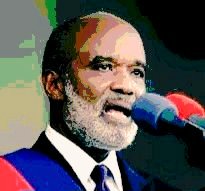The UN belongs in a museum next to the League of Nations
By Rebecca Theodore
Not even Dante Alighieri in the Divine Comedy can sum up the magnitude of Haiti’s nightmare. Yes! Hell has a local existence in today’s day. Hell is the doomed misery of Haiti. ‘Prisons built with stones of law... Brothels with bricks of religion...’ Excess sorrow magnified in multitudes dying the death of common worms in a great age of modern medicine where cholera is akin to a common cold in the west.
Reluctantly enough, the occupants of that hell are also the UN with pitchforks, drinking blood sweetened with tears, embellishing their corporate wants in bureaucratic inefficiency and waste. And like the great whore of Babylon arrayed in purple and scarlet, beckoning with golden pitchers filled with abominations and filthiness, their babbled voices penetrating thick billows of smoke - ‘ we need $164-million (US) more in special aid’ to treat a disease which was reported about two months ago, while a people and culture plummet into eternal dust.
Lurching from flood to earthquake to hurricane and now epidemic in the space of mere months, Haiti has not only emerged as the richest poorest state on the planet but it is now the raging cries of critics everywhere that ‘the UN belongs in a museum next to the League of Nations.’
This criticism no doubt must be widely hailed by people everywhere because in the same way the League of Nations failed to prevent the scourge of World War II, leading instead to added pain and suffering on all humankind, the UN has instead chosen to embezzle billions of dollars in fraud to satisfy their corporate ambitions, ignoring the perils of the Haitian people and humanity on a whole.
Judging from the incompetence and corruption in Haiti, it is easy to see why the UN is a testament of failure in calling for additional aid for a disease that can be treated with simple oral rehydration salts or antibiotics. To ask why people are dying like flies in a modern age of medicine and why they waited so long impels our thoughts back to the Congo sex scandal that went on for more than a year, even after UN officials had knowledge of allegations that their peacekeepers were raping children as young as 12, soliciting prostitutes and engaging in child abuse.
Hundreds of images of child pornography involving Congolese and Haitian children are satisfying the wants and lust of pedophiles on the internet, having been placed there from the caches found on the laptop of French UN civilians. Sadly enough, up to this day not one UN soldier has been charged, thus justifying their actions as good and righteous.
To add to this discontent, the UN also failed to act in Liberia’s seven year civil war in which hundreds of thousands were butchered. UN peacekeepers sent to Rwanda failed to prevent the murder and torture of nearly one million Rwandans. The UN failed to condemn slavery in Sudan, and failed miserably in Sierra Leone. The UN failed in Angola, in Kashmir, and in Colombia. The UN has failed to prevent genocide or provide assistance in Darfur and now we are summoned with the mother of all failures -- Haiti. This is no genocide by natural selection as many choose to claim and Nepalese troops are not the scapegoats of the blame game. It is the failed and corrupt administration of the UN.
Haiti will prove that the UN’s mission of maintaining international peace, advancing cooperation in solving economic, social and humanitarian problems, and promoting social progress and better standards of life in larger freedom is nothing but a charade… a metaphor swallowed in the bowels of political jargon to mask the passing of time. Admonishing people to wash their hands and drink boiled or potable water defies human reasoning in a country where people haven’t had a proper meal in months -- how can they afford soap?
Educating the population on cholera prevention or learning the proper hygiene concerning any epidemic will be a big task in Haiti because mistrust of colonial representatives like the UN will forever deny the psychological and physical conditions needed to understand the destructiveness of the epidemic, as medical science and concern for health is imposed by an occupying order that makes it impossible for education to produce social change, because education grows out of a colonial environment in which the preservation of lives, and the maintenance of the social structure can never be maintained.
Not only did the UN ignore the fact that a perturbing effect in one part of the system has a disastrous and far reaching consequence, which is presently mired in an epidemic that now transgresses the Haitian boundaries, making the entire Caribbean at risk; but has now evoked a new wave of political violence for the poor and destitute in Haiti, who have seen nothing but hunger and death for more than 10 months.
As fate would have it, United Nation troops are protecting and fulfilling the duties of only UN workers as has been customary. For this reason, Haitians must be obliged to seek solace in the leadership of Dr Mirlande Manigat in the upcoming presidential elections -- the first female who will ever to be elected to that office, as there must be change, not only from the corrupt dictators that have ruled Haiti for decades but also from the binding shackles and corrupt management of the UN.
And if anyone asks where hell is -- there you have it... beyond Dante's imagination --
Lasciate ogne speranza, voi ch’intrate (Abandon all hope ye who enter here)
Through Haiti you pass into everlasting pain
And into the darkness of daylight
But to the UN I say --
Better to reign in hell than serve in heaven
November 24, 2010
caribbeannewsnow


